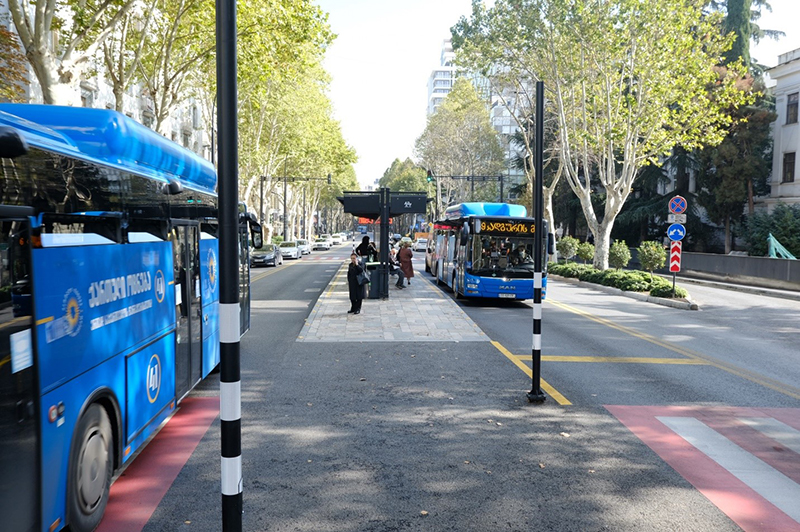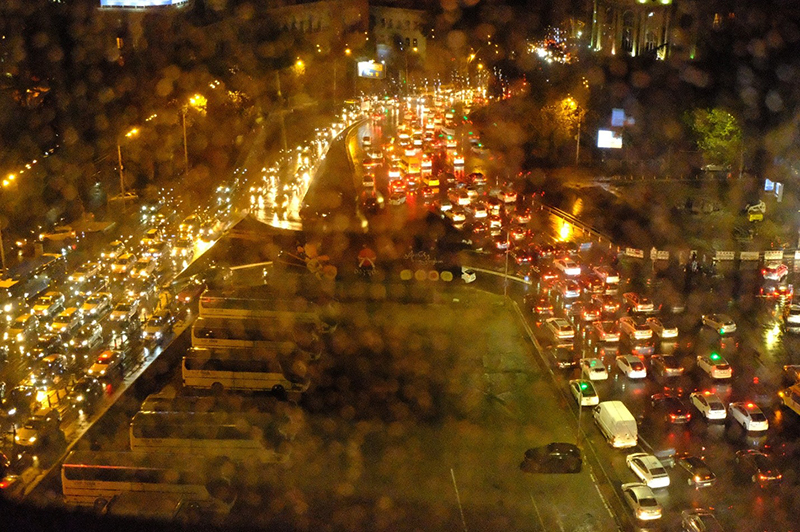
I just returned from Tbilisi and I am to start thinking of how to analyse the fieldwork on urban mobility I conducted there during October-November 2020 as part of CoMoDe project – but I’m terribly disoriented. In October I came to a city where the municipal government had insisted on sustainable, pedestrian and public transport-oriented policy changes for the past two years. Exactly before my arrival one of the pilot street infrastructural redesign projects had opened. The city mayor, Kakhi Kaladze, stood up to drivers’ outrage on limitations to car mobility by insisting he cannot be a mayor for car-drivers only, indicating that the city had to accommodate for a diversity of urban dwellers’ mobility needs.
Fast forward to end of November and the picture turns around. Public transport, in its all modalities (intercity trains and buses, and urban transport such as metro, buses and minibuses in larger cities), was first to go amidst the Covid-19 containment measures. This was not even a part of comprehensive lock-down, but part of selective measures. The government declared they were too scared to entirely shut down the economy, as they realised the poor would starve. Simultaneously they expected the same poor to commute to work in the absence of public transport. While the national government was the one to put in place the measures, Tbilisi municipal government (representing the same governing party), neither resisted not attempted to put in place at least some provisional or targeted measures to alleviate public transport closure.
The closure of public transport puts the city governments’ commitment to public transport-oriented politics upside down. It redirects and distracts me from my initial research questions, relating to conceptions of modernity and justice and the role of expertise and knowledge transfer in shaping urban mobility politics, toward a different set of research questions: how to judge policy sustainability? Is the crisis an ultimate litmus test for policy intentions? Which other countries have afforded to shut down public transport systems and how so?
Sustainability and Social Justice turn
Not that I can solve these challenges in this short blog but let me at least explicate what drove me to this disorientation. On the one hand stands the initial part of my fieldwork, where I observed something what one could call positive developments. I took interviews with former employees of the Tbilisi city hall, urban planning and transport professionals, urban studies scholars, and transport activists, I visited sites of new infrastructural developments and read through policy and media documents, to observe that after three decades of car-oriented policies, the city hall has been shifting away from its orthodox approach. In 2018, Tbilisi city hall declared they worked towards a sustainable urban mobility plan, refocusing urban mobility politics towards pedestrians and public transport users. Throughout the past two years, the city hall has indeed implemented a number of significant changes:
- two pilot projects of street infrastructure redesign, broadened pedestrian and public transport space, shutdown of underground passageways, zebra crossings and dedicated bus lanes(one in the city centre, and another in one of the peripheral, Soviet-era housing districts);
- renewal of the municipal bus fleet, and even minibuses, (marshrutkas) effectively taking the marshrutka sector from private back to public hands;
- plan of restructuring public transport routes; and
- a general sustainable urban mobility plan, which is in its final drafting phase.
This radical turnaround towards what seems to be a socially and environmentally sensible mobility politics is univocally welcomed by most commentators, given that Tbilisi is heavily private car-dependent and congested, with its notorious levels of air pollution being induced almost entirely by transport-related emissions.
Efforts undone
The municipal governments’ concern with public transport users evaporated at the time when selective measures for Covid-19 were to be adopted. Starting from late November till, to the least, the end of January, only private vehicles and taxis are allowed to move around the city. This creates big hurdles for Tbilisian urban dwellers compared to the shorter but more comprehensive lockdown in spring. Still, a big share of the population is expected to show up at their workplaces. The situation is complicated by the fact that groups we now call essential workers- healthcare, construction, law enforcement, and food retail workers – predominantly commute from city’s peripheries and work for low wages.

Public transport closures led to even more intensified traffic jams, higher taxi fares, and an obviously further burden on lower-income populations. With the state entirely stepping back from mobility provision, good old social networks got activated in attempt to overcome mobility restrictions. Colleagues and neighbours started organising ride-shares, and families turned to using old vehicles. In the latter case, not only further repair costs were induced on households, but often those reincarnated vehicles do not and in principle cannot get through technical check-ups, leading to accumulation of fines for violating technical maintenance rules. In some, but relatively rare cases private companies, especially private clinics organised transportation for their employees.
The picture gets gloomier when we zoom out of mobility politics and have a look at the crisis management throughout the past year. For one, small scale decisions, such as holiday related easing of COVID-19 measures indicate a consistent anti-poor attitude of the national government. During the week leading to the New Years’ eve (the holiday that come a week before Georgian Orthodox Christmas and is far more significant of a celebration than Christmas), only large shopping malls were allowed to reopen temporarily, excluding the most needy – street vendors and bazaar traders – from the chance to benefit from holiday-related sales. In addition, since spring 2020, the national government has been elaborating plans to support and subsidise Tbilisi’s construction sector, infamous for the creation of a speculative housing market, reliance on a range of extra-legal mechanisms, and lack of workplace security on construction sites, which has left dozens of construction workers dead during the past decade. While these decisions were rather the competence of the state-level decision making, the municipal government was in full accordance with and reinforced the explicit anti-poor politics within its own competences. The municipal government found it important to restrict illegal construction right in the middle of a harshest health and economic crisis, bulldozing down the improvised shelters of the most marginalised on the peripheries of the city.
What next?
As I mentioned before, these developments make it impossible for me as a researcher to think of transitions in mobility politics in isolation from the rest of municipal and state-level policy choices. While I have no intention to redirect my planned research towards an exploration of the impacts of Covid-19, it also becomes impossible to ignore that policy directions are majorly questioned if not reversed in the light of this crisis. On a brighter side, even if we have not witnessed broader social mobilisation against the closure of public transport, just recently, on January 15th a number of non-governmental organisations (headed by the movement ‘iare fexhit’ or ‘walk’) publicly addressed the government asking to re-establish transport provision. They state that the closure of public transport hits hardest the poorest residents of peripheralised districts, represents a case of discrimination and stands in direct opposition to the declared sustainable urban mobility planning (https://www.facebook.com/IarePekhit_).
Indeed a range of activists, civil society groups, public officials and specialists have worked for years to elaborate this somewhat more socially just direction of urban mobility planning. Perhaps it resurfaces or survives through this crises if it has enough defenders, despite the fact that the national as well as city officials have shown no respect and commitment to it, and exposed the malleability of the project at the first chance. While I can probably slowly uncover answers to these questions, my biggest concern so far goes to those affected by public transport closures in the city.
Dr Lela Rekhviashvili is a researcher in the Department of Regional Geography of Europe at the IfL.
